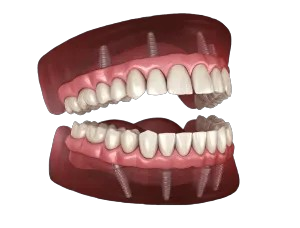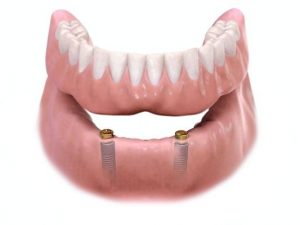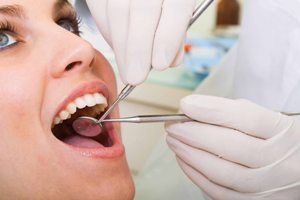
For many patients, one of the biggest complaints of and fixed bridges is that food particles can get trapped between the gum and the prosthesis.
Dental implants, especially the innovative All-on-4 technique, are the best solution to your partial denture or fixed bridge problems. With 4 dental implants, you won’t experience any of that pesky irritation or discomfort.
Understanding Dental Implants
Definition and Function of Dental Implants
Dental implants are a revolutionary solution for those dealing with missing teeth. These artificial tooth roots, crafted from biocompatible titanium, are surgically embedded into the jawbone. Once in place, they serve as a sturdy foundation for various dental prostheses, such as crowns, bridges, or dentures.
The primary goal of dental implants is to mimic the function and appearance of natural teeth, providing a permanent and aesthetically pleasing replacement option. By integrating seamlessly with the jawbone, dental implants offer unparalleled stability and support, making them a popular choice for restoring smiles and enhancing oral health. With dental implants in Rockville, patients can enjoy lasting comfort and functionality, ensuring their restored teeth feel as natural as they look.
How Dental Implants Compare to Natural Teeth
Similarities and Differences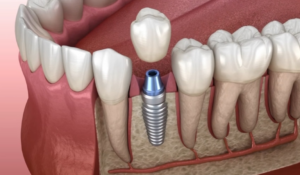
Dental implants are ingeniously designed to replicate the look and function of natural teeth. Like natural teeth, they are anchored firmly in the jawbone, providing a stable base for chewing and speaking. However, there are some notable differences.
While natural teeth are composed of enamel and dentin, dental implants are made from titanium, a material known for its strength and biocompatibility. Another key difference is that dental implants lack nerves and pulp, meaning they don’t experience sensations like natural teeth do.
Despite these differences, dental implants offer a reliable and durable solution for those seeking to replace missing teeth with a natural-looking alternative.
Food Particles Will Never Get Stuck Under a Single Dental Implant Tooth
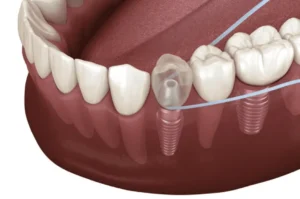
Using dental floss is essential for cleaning around dental implants and dental crowns. Specialized flosses are available to aid in cleaning around dental crowns, which can help prevent the entrapment of food particles and plaque, thus promoting better oral health.
A well-constructed dental implant is an absolute work of art that will fit in your mouth as though it were a natural tooth. It will keep a tight seal with your gums, minimizing any potential openings where food can get caught. Regular dental check-ups are crucial for maintaining oral hygiene and ensuring the longevity of your dental implants. These check-ups allow dentists to assess implant health and provide personalized oral hygiene recommendations.
Unlike a normal tooth, dental restorations are completely cemented in place, so food (and other things) can’t get stuck underneath. However, it is important to floss effectively under the implant crown to remove food particles and food debris that can accumulate. Proper oral hygiene practices, such as brushing and using specialized floss, are essential for maintaining oral hygiene and preventing the buildup of remaining food particles around the implant crown.
If food ever gets stuck in your implant, it may mean the implant was placed incorrectly. This can be easily fixed with a simple re-placement at low cost. See Dr. Norkiewicz for a consultation.
Food May Get Stuck Under All on Four and Snap on Dentures
Factors Contributing to Food Entrapment
Implant Placement and Design
The placement and design of dental implants play a crucial role in preventing food entrapment. If an implant is not positioned correctly, it can create small gaps between the implant and the surrounding gum tissue, allowing food particles to become trapped.
Similarly, if the dental prosthesis does not fit snugly around the implant, it can leave spaces where food can accumulate. To avoid these issues, it is essential to work with a skilled dentist who can ensure proper implant placement and design. By doing so, you can minimize the risk of food entrapment and maintain optimal oral hygiene. Proper implant placement and a well-designed dental prosthesis are key to enjoying the full benefits of dental implants without the hassle of trapped food particles.
While it’s possible for food to get stuck underneath an implant bridge or implant denture, they are easier to clean than natural teeth. Also, you never have to worry about food particles collecting on the dental implant or around a dental crown. Cleaning around a dental crown is crucial for maintaining oral hygiene, as it helps prevent the entrapment of food particles and plaque.
Implant-supported dentures provide access to the gums and food particles so that you can thoroughly clean your mouth and gums.
Brushing and cleaning the All on 4 isn’t hard, but flossing them can be. The patented Waterpik® Water Flosser is the most efficient way to clean your gums and dental work.
With a simple pump of the handle, you can shoot water deep between your teeth. Using the built-in pressure control, you can select a stream that’s right for you! Also, no matter how often you use it, water flossing is gentle on gum tissue.
Dental Implant Teeth are Easy to Keep Clean for Oral Hygiene
When you’re missing teeth, eating and speaking can be a challenge. Not only does it affect appearance but it also affects your overall health. A dental implant or an implant-supported bridge or full denture is the best way to replace one tooth or an entire mouth of teeth.
For more information about dental implants, including how they work, their cost, and how we can help you get started on your new smile, contact us today.

